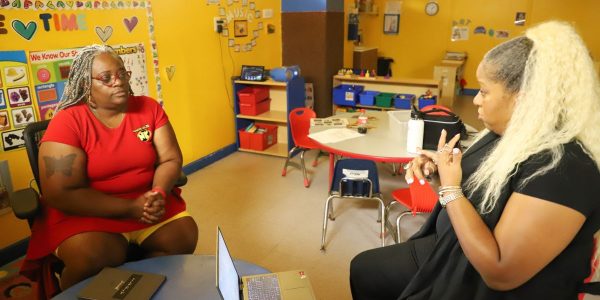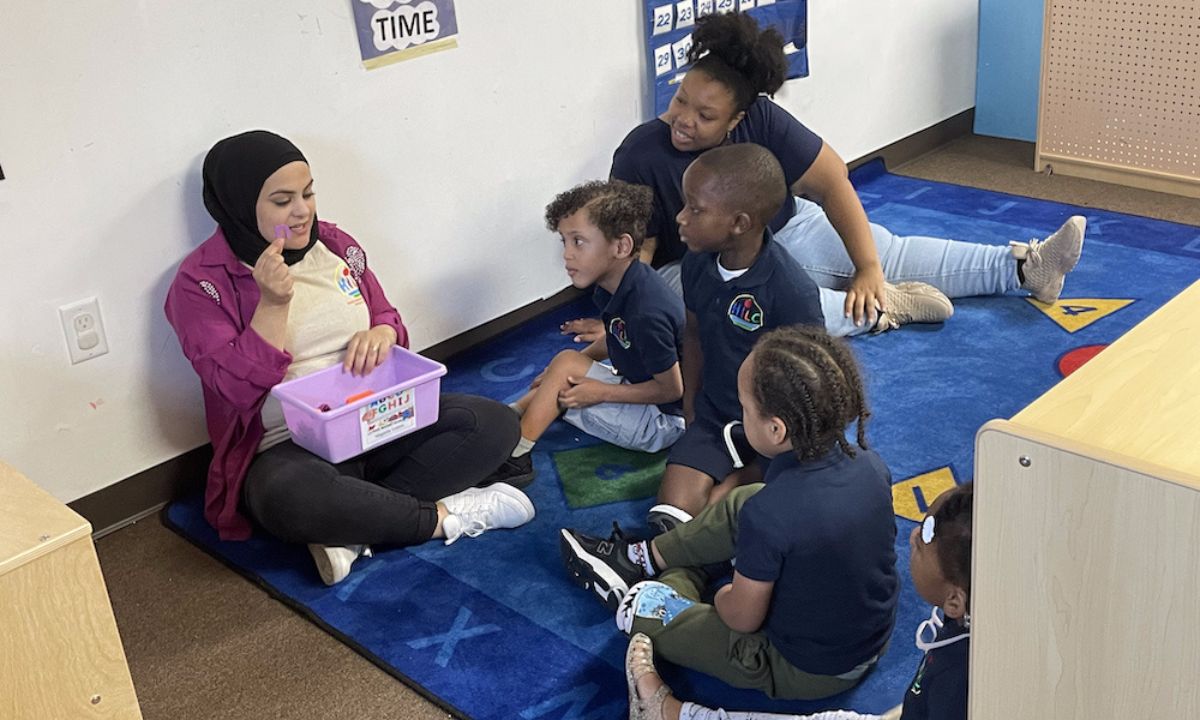Stephanie Simon, program manager of First Up, was on her way to a site visit when her phone rang.
“If you hadn’t answered the phone,” sighed an early-childhood teacher in an underinvested neighborhood of Philadelphia, “I was walking out the door.”
This was more than the usual bad day, recalls Simon, an educator with 34 years of experience. The caller — an award-winning master teacher — was on the brink. “I was able to talk her off the ledge,” she says.
This teacher has remained on the job, despite the challenges of working in a neighborhood beset by poverty and violence. Simon reports, “I let her air out everything she needed to say. I responded, ‘Okay. So what do we need to do to make sure you’re safe, that you have the support that you need? Because there are times when I may not pick up the phone. What’s in your toolkit?’ And we went right to what was in the safety plan we had developed together.” The teacher realized that a failure to take time off (an understandable reaction to the stress all around her) meant taking on an unsustainable level of stress herself, which ultimately jeopardized her own well-being — and that of the children and family she serves.
“She is really engaging in soul care — that’s the alternative to self-care suggested by Dr. Veirdre Jackson — and reminding herself why she chose this field in the first place.”
Another educator had what Simon describes as a beautiful environment, but the program manager sensed, “She didn’t understand the power of her own voice,” which meant the teacher lacked influence in her own classroom. In this instance, aid came in the form of helping the educator to become embedded in the early childhood community.
In both exchanges, Simon took away important lessons that could be used for future coaching sessions. That is, while First Up’s experienced coaches are there for Philadelphia’s early learning workforce, the relationships they foster with educators are mutually beneficial.
The mentorship flows back and forth.

The Keystone to Quality
First Up supports educators through the Early Education Quality Improvement Program (EQUIP), focusing on those who have two stars according to Keystone STARS, Pennsylvania’s Quality Rating and Improvement System (QRIS) and helping them move up to three or four stars.
According to the 2023 Child Trends assessment: “As cities and states around the country consider how to make quality improvement a more equitable and sustainable process, the implementation of EQUIP can offer important insights into the value of relationship-based coaching. Across data collection efforts, coaches and providers in EQUIP consistently described the importance of their relationships to supporting programs in multiple dimensions of quality improvement.”
QRIS programs across the country have come under scrutiny in recent years, with some advocates questioning their efficacy or even calling for their abolition. Lisa Schultz, First Up’s director of programs, says the organization is in the midst of an inquiry in how it defines quality.
“It involves interactions with the children,” she says. “It’s the environment, it’s supporting families. A holistic approach to coaching drives EQUIP that goes beyond skill building.” Emotional intelligence, she adds, corresponds with positive learning outcomes.
Related: QUALITYstarsNY: Growing the Empire State’s Child Care Sector
According to Schultz, a 24-year veteran of First Up, EQUIP grew out of the United Way’s Success By 6 project, which provides multi-tiered levels of supports for child care centers. First Up also supports educators in family child care settings.
“We’re often the gateway program that leads to additional supports,” says Alyssa Cruz, manager of EQUIP and previously director at a Head Start program, citing Positive Racial Identity Development in Early Education (PRIDE), a University of Pittsburgh program for teachers, program directors, families and system leaders that recently completed an environmental scan of racial disparities in the Philadelphia area.
The team at First Up also advocates for ways Keystone STARS can be more responsive to the workforce. Schultz believes in closer alignment with NAEYC’s quality standards, while Simon would like to see Pennsylvania emulate California’s focus on mental health.
Coaching for Reflection
Cruz credits Coaching with Powerful Interactions by Judy Jablon, Laura Dombro and Shaun Johnsen for centering First Up’s coaching interactions on relationships.
The book outlines strengths-based, relationship-based coaching, as opposed to monitoring, which is about highlighting deficiencies. “Connecting with directors and teachers is the most important component of being able to have powerful coaching interactions,” she explains. “When our coaches foster respectful trust and relationships, they’re able to develop mutual learning partnerships.”
Related: Promising Practices in Alabama Using a Shared Leadership Model for Early Learning Coaching
“Reflection is where the change happens,” says Schultz. She describes a teacher who was struggling to hold children’s attention during circle time. “Kids were jumping all over each other,” she recalls. “When the time came to reflect, I asked her, ‘What is it that you liked about the activity?’ So first we talked about what went well, and then I asked her what things were a challenge. And I didn’t have to tell her. She was able to tell me herself.” These mutually trusting relationships allow for deeper engagement that transcends quality.
Simon summarizes: “Everyone has something they’re good at. We just have to be able to identify it. That helps me establish the trust. The moment you highlight what a teacher is doing well. Their bodies relax; the barriers come down.”

Mark Swartz
Mark Swartz writes about efforts to improve early care and education as well as developments in the U.S. care economy. He lives in Maryland.



